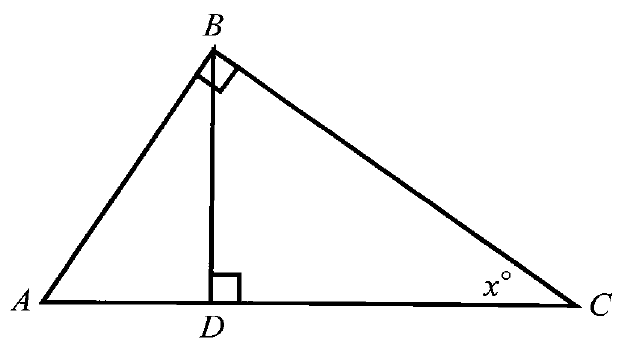ANGLE BETWEEN TWO CURVES
Angle between two curves, if they intersect, is defined as the acute angle between the tangent lines to those two curves at the point of intersection.
For the given curves, at the point of intersection using the slopes of the tangents, we can measure
the acute angle between the two curves. Suppose
y = m1x + c1 and y = m2x + c2
are two lines, then the acute angle θ between these lines is given by,

(i) If the two curves are parallel at (x1, y1), then
m1 = m2
(ii) If the two curves are perpendicular at (x1, y1) and if m1 and m2 exists and finite then
m1 x m2 = -1
Problem 1 :
Find the angle between the rectangular hyperbola xy = 2 and the parabola x2 + 4y = 0 .
Solution :
Slope of rectangular hyperbola :
x(dy/dx) + y(1) = 0
dy/dx = -y/x
Slope of parabola :
x2 + 4y = 0
2x+4(dy/dx) = 0
dy/dx = -2x/4
dy/dx = -x/2
To find point of intersection of the curves.
y = x/2 ----(1) and y = -x2/4 ----(2)
-x2/4 = x/2
-x3 = 8
x3 = -8
x3 = (-2)3
x = -2
By applying x = -2 in (1), we get
y = -2/2
y = -1
At (-2, -1)
|
m1 = -y/x At (-2, -1) m1 = -(-1)/(-2) m1 = -1/2 |
m2 = -x/2 At (-2, -1) m2 = -(-2)/2 m2 = 1 |
Angle between the above curves :
m1 - m2 = -1/2 - 1 = -3/2
m1 x m2 = -1/2 x 1 = -1/2
tan θ = |(-3/2)/1-(-1/2)|
tan θ = |(-3/2)/(1/2)|
θ = tan-1(3)
Problem 2 :
Show that the two curves x2 − y2 = r2 and xy = c2 where c, r are constants, cut orthogonally
Solution :
If two two curves are intersecting orthogonally, then
m1 x m2 = -1
x2 − y2 = r2
2x-2y(dy/dx) = 0
-2y(dy/dx) = -2x
m1 = dy/dx = -x/y -----(1)
xy = c2
x(dy/dx) + y(1) = 0
m2 = dy/dx = -y/x -----(2)
m1 x m2 = (-x/y) (-y/x)
= -1
So, the given curves are intersecting orthogonally.
Problem 3 :
If the curves y = 2ex & y = ae-x intersect orthogonally, What is the value of a ?
Solution :
If two two curves are intersecting orthogonally, then
m1 x m2 = -1
y = 2ex
m1 = dy/dx = 2ex -----(1)
y = ae-x
dy/dx = ae-x (-1)
m2 = - ae-x -----(2)
m1 x m2 = (2ex) (- ae-x)
-1 = -2aex-x
-1 = -2ae0
1 = 2a(1)
2a = 1
a = 1/2
When the given curves are intersecting orthogonally, the value of a is 1/2.
Problem 4 :
Show that the curves x = y2 & xy = k cut at right angles if 8k2= 1
Solution :
x = y2 ------(1)
xy =k ------(2)
Finding slope from (1),
1 = 2y(dy/dx)
m1 = dy/dx = 1/2y
Finding slope from (2),
x(dy/dx) + y(1) = 0
m2 = dy/dx = -y/x
Finding the point of intersection of the curves :
Applying (1) in (2), we get
y2 y = k
y3 = k
y = k1/3
Applying the value of y in x = y2, we get
x = (k2)1/3
x = k2/3
When the tangent lines drawn for the curve meet at right angle, we understand that the curves are perpendicular.
(1/2y) x (-y/x) = -1
-1/2x = -1
2k2/3 = 1
(2k2/3)3 = 13
8k2 = 1
Hence it is proved.
Problem 5 :
At what point on the curve y = x2 does the normal make an angle of 30 clockwise with the x-axis
Solution :
y = x2
dy/dx = 2x
Slope of tangent = 2x
Slope of normal = -1/2x ----(1)
m = tan θ
m = tan 30
m = 1/√3 ----(2)
(1) = (2)
-1/2x = 1/√3
√3 = -2x
x = -√3/2
Applying the value of x, we get
y = (-√3/2)2
y = 3/4
So, the required point is (-√3/2, 3/4)
Problem 6 :
Find the co-ordinates of the point on the curve
x1/2 + y1/2 = 4
at which tangent is equally inclined to the axes.
Solution :
Since the tangent line that we draw makes equal angle with x-axis and y-axis.
So, the required angle is 45 degree.
m = tan θ
m = tan 45
m = 1
x1/2 + y1/2 = 4
√x + √y = 4 -----(1)
Differentiating with respect to x, we get
1/2√x + (1/2√y)dy/dx = 0
(1/2√y)dy/dx = - 1/2√x
dy/dx = -2√y/2√x
dy/dx = -√y/√x
Slope = 1
-√y/√x = 1
√x = -√y
Squaring both sides, we get
x = y
Applying the value of x in √x + √y = 4
√x + √x = 4
2√x = 4
√x = 4/2
√x = 2
Squaring both sides
x = 4
y = 4
So, the required point is (4, 4).
Kindly mail your feedback to v4formath@gmail.com
We always appreciate your feedback.
©All rights reserved. onlinemath4all.com
Recent Articles
-
Digital SAT Math Problems and Solutions (Part - 144)
Apr 14, 25 07:27 PM
Digital SAT Math Problems and Solutions (Part - 144) -
Quadratic Equation Problems with Solutions (Part - 1)
Apr 14, 25 11:33 AM
Quadratic Equation Problems with Solutions (Part - 1) -
Quadratic Equation Problems with Solutions (Part - 2)
Apr 14, 25 11:22 AM
Quadratic Equation Problems with Solutions (Part - 2)
